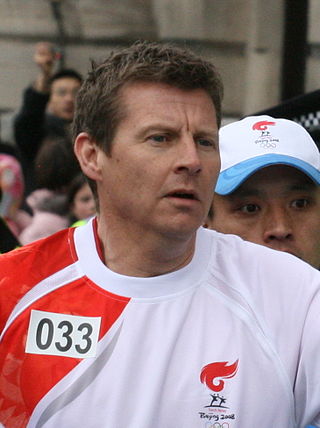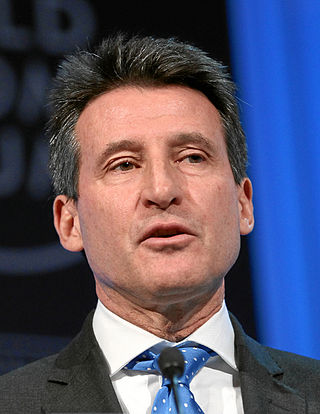Related Research Articles

Sir John George Walker, is a former middle-distance runner from New Zealand who won the gold medal in the men's 1500 m event at the 1976 Olympics. He was also the first person to run the mile in under 3:50. After his running career was over he was active in local government, as an Auckland Councillor and representing the Manurewa-Papakura ward.

Stephen Cram, is a British retired track and field athlete. Along with fellow Britons Sebastian Coe and Steve Ovett, he was one of the world's dominant middle distance runners during the 1980s. Nicknamed "The Jarrow Arrow", after his home town, Cram set world records in the 1,500 m, 2,000 m, and the mile during a 19-day period in the summer of 1985. He was the first man to run 1,500 m under 3 minutes and 30 seconds. He won the 1,500 m gold medal at the 1983 World Championships and the 1,500 m silver medal at the 1984 Olympic Games.

Sebastian Newbold Coe, Baron Coe,, often referred to as Seb Coe, is a British sports administrator, former politician and retired track and field athlete. As a middle-distance runner, Coe won four Olympic medals, including 1500 metres gold medals at the Olympic Games in 1980 and 1984. He set nine outdoor and three indoor world records in middle-distance track events – including, in 1979, setting three world records in the space of 41 days – and the world record he set in the 800 metres in 1981 remained unbroken until 1997. Coe's rivalries with fellow Britons Steve Ovett and Steve Cram dominated middle-distance racing for much of the 1980s.

Stephen Michael James Ovett, is a retired British track athlete. A middle-distance runner, he was the gold medalist in the 800 metres at the 1980 Olympic Games in Moscow. Ovett set five world records for 1500 metres and the mile run, and a world best at two miles. He won 45 consecutive 1500 and mile races from 1977 to 1980.

Steve Scott is an American former track athlete. The silver medalist in the 1500 meters at the inaugural IAAF World Championships in Athletics in Helsinki in 1983, Scott owns the U.S. indoor record in the 2000 meters (4:58.6-1981). He held the American outdoor mile record for more than 26 years and also is the former American indoor record holder in the same event. Track & Field News ranked Scott #1 in the U.S. on 10 occasions, and 11 times during his career he was ranked in the top ten in the world by T&FN. Additionally, he participated for the US team at the 1984 Olympics. He finished 5th in the 1500 meter run at the 1988 Olympics held in Korea. Scott was also an Olympian on the 1980 Olympics team which was not allowed to go to Moscow. He ran the sub four-minute mile on 136 occasions in his career, more than any other runner in history.
The Dream Mile may refer to the annual Diamond League race in Oslo at Bislett Stadium, or several historic individual races featuring top middle-distance runners.

The women's 1500 metres at the 2004 Summer Olympics as part of the athletics program were held at the Athens Olympic Stadium from August 24 to 28.

A pacemaker or pacesetter, sometimes informally called a rabbit, is a runner who leads a middle- or long-distance running event for the first section to ensure a high speed and to avoid excessive tactical racing. Pacemakers are frequently employed by race organisers for world record attempts with specific instructions for lap times. Some athletes have essentially become professional pacemakers. A competitor who chooses the tactic of leading in order to win is called a front-runner rather than a pacemaker.
Peter Elliott is a former middle-distance runner from the United Kingdom. During his career, he won the gold medal in the 1500 metres at the 1990 Commonwealth Games, the silver medal in the 1500 metres at the 1988 Olympic Games, and the silver medal in the 800 metres at the 1987 World Championships.
Jack Richard Buckner is a former British athlete.

The mile run is a middle-distance foot race.

The men's 1500 metres was an event at the 1984 Summer Olympics in Los Angeles, California. The final was held on August 11, 1984. Fifty-nine athletes from 40 nations competed. The maximum number of athletes per nation had been set at 3 since the 1930 Olympic Congress. The event was won by 0.87 seconds by Sebastian Coe of Great Britain, the first man to successfully defend an Olympic 1500 metres title. Steve Cram's silver made it the first time a nation had gone 1–2 in the event since Great Britain had done it in 1920. José Manuel Abascal's bronze was Spain's first medal in the event.
The men's 800 metres was an event at the 1980 Summer Olympics in Moscow, Soviet Union. There were a total number of 41 participating athletes from 28 nations, with six qualifying heats, three semifinals, and the final held on Saturday July 26, 1980. The maximum number of athletes per nation had been set at 3 since the 1930 Olympic Congress. The event was won by 0.5 seconds by Steve Ovett of Great Britain, the nation's first gold medal in the men's 800 metres since winning four in a row from 1920 to 1932. It was Great Britain's sixth overall title in the event.

Genzebe Dibaba Keneni is an Ethiopian middle- and long-distance runner. A 1,500 metres 2016 Rio Olympics silver medalist, she won a gold medal in this event and a bronze in the 5,000 metres at the 2015 World Championships. Genzebe is the current world record holder for the indoor events of the one mile, 3,000m and 5,000m.
Johan Fourie is a South African middle-distance athlete who was one of the world's leading 1500m/mile exponents in the 1980s but was prevented from competing internationally in his prime due to the sporting sanctions imposed on South Africa in condemnation of the policy of apartheid.
Mark Fricker is a retired middle-distance track and field runner who achieved the sub-four-minute mile in the 1980s. Fricker failed to win many of the races he ran because he did not possess the fast finishing kick of his contemporaries like Steve Scott, John Walker, Eamon Coughlan, Sydney Maree, Ray Flynn and the other legends of 1980s mile racing. His only actionable strategy to win was to run hard from the beginning of the race.
These are the official results of the Men's 800 metres event at the 1978 European Championships in Prague, Czechoslovakia. The final was held on 31 August 1978.

Charles Da'Vall Grice, informally known as Charlie Grice, is a British middle-distance athlete.

The IAAF Golden Events were a sporadic series of twelve athletics events organised by the International Amateur Athletics Federation (IAAF) from 1978 to 1982. Aside from the inaugural event in Tokyo, the contests were held in Europe and were attached to independent track and field meetings. The purpose of the events was to raise the profile of the sport outside of Olympic competition. Marking the growing professionalism in athletics, a significant prize pot was given to the winner of the event – a move designed to attract the sport's top athletes to compete against each other at the same meeting. The inaugural prize was an 18-carat gold trophy worth 9,500 US dollars. All twelve events were for men, reflecting their position as the most prominent sex during that period.

Mario García Romo is a Spanish middle-distance runner, who specializes in the 1500 metres. He was the national champion in the event in 2022, and he represented Spain in the 1500 m at the 2022 and 2023 World Championships, finishing fourth and sixth.
References
- ↑ "OSU Outdoor Records" (PDF). The Ohio State University. Retrieved 2008-02-17.
- ↑ "T&FN: 2014 Women's U.S. Junior Absolute Leaders".
- ↑ "All-time men's best mile race". Track and Field All Time Performances. Retrieved 2020-07-18.
- ↑ Turnbull, Simon (1982). Steve Ovett : portrait of an athlete. London: W.H. Allen. p. 113. ISBN 0352312777.
- ↑ "ESPN.com - MORESPORTS - How low can Loroupe go?".
- ↑ Smythe, Steve (26 December 2020). "Sebastian Coe: Britain's greatest ever athlete?". Athletics Weekly . Retrieved 10 June 2021.
- ↑ "Student killed on tracks". Kentucky Kernel. Retrieved 2007-04-23.